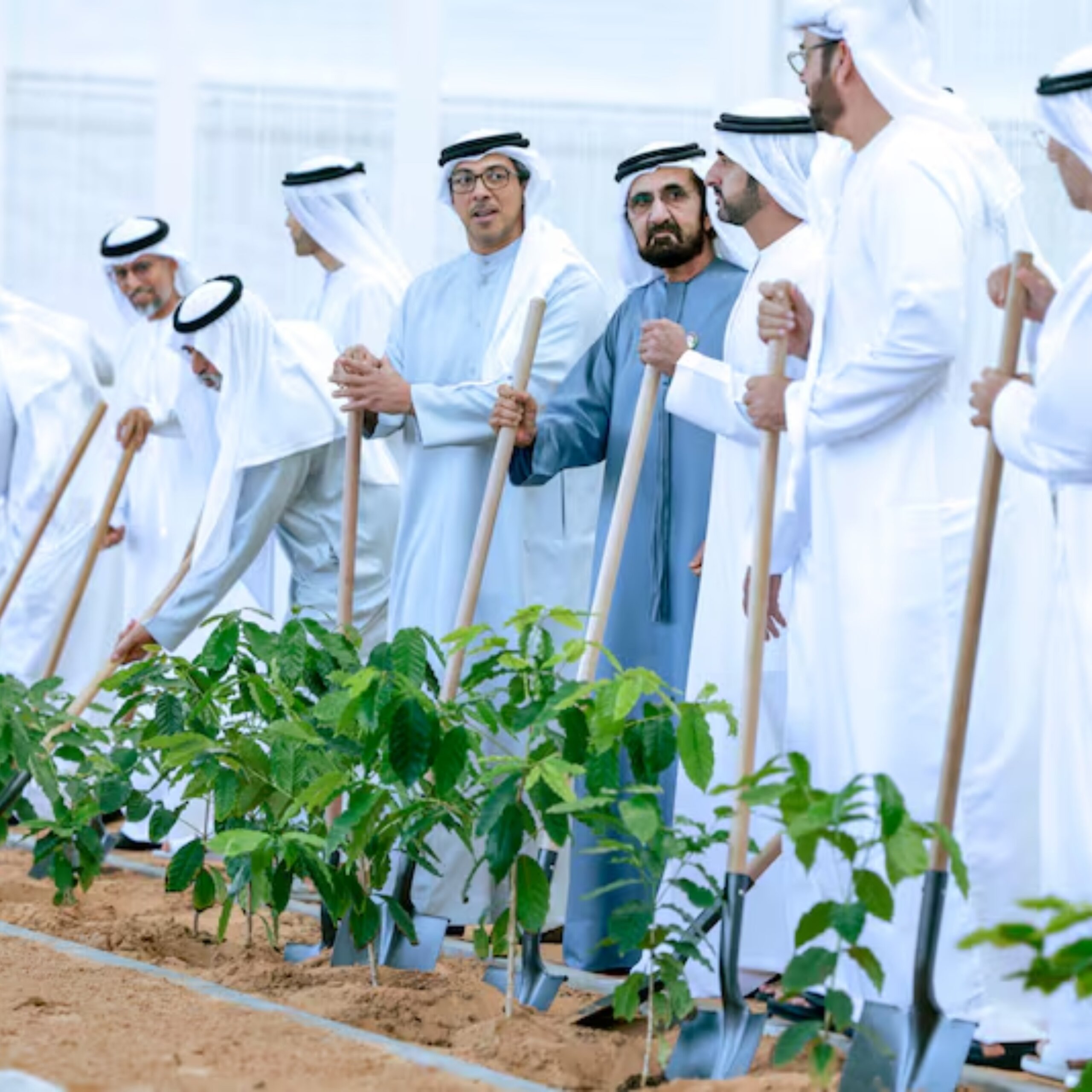On October 6th, His Highness Sheikh Mohammed bin Rashid Al Maktoum, Vice President, Prime Minister, and Ruler of Dubai, launched the “Plant the Emirates” national program. The program consists of several initiatives that align with the UAE’s vision to advance agricultural development and boost sustainable national food security.
The announcement was made during the UAE Cabinet meeting held in Al Marmoom, Dubai. The meeting was attended by His Highness Sheikh Mansour bin Zayed Al Nahyan, Vice President, Deputy Prime Minister, and Chairman of the Presidential Court; His Highness Sheikh Hamdan bin Mohammed bin Rashid Al Maktoum, Crown Prince of Dubai, Deputy Prime Minister, and Minister of Defence; and His Highness Lt. General Sheikh Saif bin Zayed Al Nahyan, Deputy Prime Minister, and Minister of the Interior.
His Highness Sheikh Mohammed bin Rashid Al Maktoum said, “The national program ‘Plant the Emirates’ carries forward the legacy of the late Sheikh Zayed, fulfilling his vision to green, cultivate, and nurture the land of the UAE. Our goal is to embed a culture of agriculture in every school, every home, and in the hearts of our future generations.”
He added, “This program is designed to strengthen our food security, advance agricultural technologies, build new partnerships with the private sector, and expand our green spaces, ensuring sustainability for our future.”
“As part of the initiative, the Cabinet approved the establishment of The National Agriculture Centre, a driving force for this sector in the coming years. It will provide technical and technological support, foster partnerships, launch initiatives, and promote local agricultural products,” he continued.
“Agriculture in the UAE is Sheikh Zayed’s legacy. It is a pillar of security, sustainability, and prosperity for this cherished land. We call on everyone to join this national project with ideas, and initiatives, and by spreading the culture of agriculture. The seeds we plant today will flourish for generations to come,” His Highness Sheikh Mohammed explained.
الإخوة والأخوات .. نطلق اليوم برنامجاً وطنياً لتنشيط وتحفيز القطاع الزراعي في دولة الإمارات .. وذلك ضمن اجتماع استثنائي لمجلس الوزراء بمزارع المرموم …
البرنامج الوطني “إزرع الإمارات” هدفه مواصلة إرث زايد رحمه الله ووصيته في تشجير وتخضير وتعمير أرض الإمارات بالزراعة ..… pic.twitter.com/rTk7iSxW6z
— HH Sheikh Mohammed (@HHShkMohd) October 6, 2024
The Plant the Emirates programme supports the UAE’s vision to advance agriculture development and achieve sustainable national food security. It aims to encourage local community members to practice domestic agriculture by cultivating key agricultural products at home, expanding green spaces in the country, supporting environment protection efforts, and making the UAE agricultural products a synonym for quality and high nutritional value. The program also coincides with the “Year of Sustainability 2024” and aims to enhance the UAE’s sustainability ecosystem.
The national program partners with all federal and local government entities, municipalities’ teams, private sector organizations, and community members. The program is launching national campaigns, events, exhibitions, and seasonal markets to display and market crops and agricultural products under a unified identity. It will also organize volunteer programs and competitions for students and the public, launch the World’s Coolest Winter campaign under the slogan of “Green Tourism”, and offer advisory and specialized programs and services for farmers and the private sector.
The National Agriculture Centre, which is part of the “Plant the Emirates” program initiatives, will be responsible for developing and implementing strategic initiatives and programs aimed at increasing productivity, improving supply chains, and reducing agricultural production costs. It will also seek to minimize agricultural waste and support the marketing of local agricultural products. By providing technical support for innovative projects, the center will ensure that the agricultural sector continues to evolve, adopting modern practices and technology-driven solutions.
Over the next five years (2025-2030), the center will focus on raising the number of productive farms in the country by 20%, increasing the number of organic farms by 25%. Furthermore, the center seeks to foster the adoption of climate-smart solutions across 30% of farms, reduce agricultural waste by 50%, increase the use of local farm-grown produce in restaurants and hotels throughout the UAE by 25%, and increase the number of workers in the sector by 15%.
During the meeting, the Cabinet was briefed on the progress of the Biodiversity Sites Project, which is being led by the Ministry of Climate Change and Environment in collaboration with the International Union for Conservation of Nature (IUCN) and various government and academic institutions. The project aims to identify key biodiversity sites in the UAE based on international standards and develop geographic maps outlining the boundaries of these critical areas.
Nine key biodiversity sites have been identified based on international criteria and added to the global biodiversity sites database. These sites include the Arabian Oryx Sanctuary in Umm Al Zamul (Abu Dhabi), Marawah Marine Biosphere Reserve (Abu Dhabi), Yasat Marine Protected Area (Abu Dhabi), Al Marmoom Desert Conservation Reserve (Dubai), the Dubai Desert Conservation Reserve (Dubai), Wadi Al Helo (Sharjah), Khorfakkan and Shark Island (Sharjah), Wadi Bih (Ras Al Khaimah), and Siniyah Island and Khor Al Beidah (Umm Al Qaiwain). Additionally, two global biodiversity sites have been identified for the Arabian gazelles, including the Arabian Sand Gazelle, and the Arabian Oryx, marking them as the first key sites recognized for the biodiversity of these mammals in the world. Additionally, two sites of global importance for biodiversity for dugongs (sea cows) were identified in the UAE, which are the first sites of their kind in the Middle East.
This biodiversity project is set to enhance the UAE’s environmental competitiveness globally by increasing the percentage of the protected area among the key biodiversity sites from 37.59% to 98.13%, as well as increasing the index of marine protected areas among key biodiversity sites from 48.61% to 98.17%, and the index of the terrestrial protected areas from 51.55% to 98.08%.
The Cabinet meeting also addressed progress on the UAE Circular Economy Agenda 2031. Key achievements include regulating waste transfer, supporting local investments, legislating plastic scrap trade, promoting recycled materials in consumer goods, and establishing regulations for using food waste and biofuels.
-WAM






